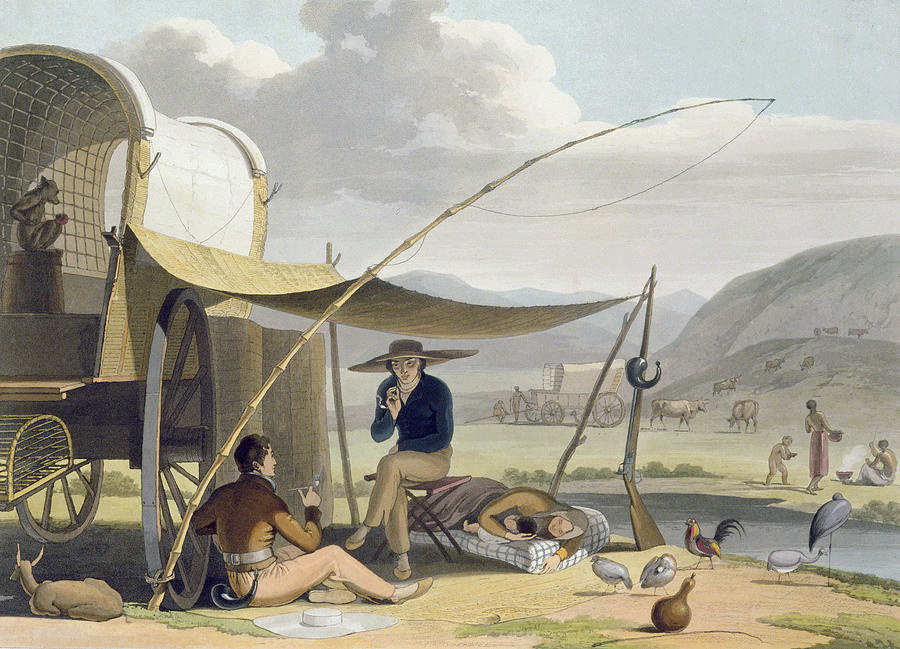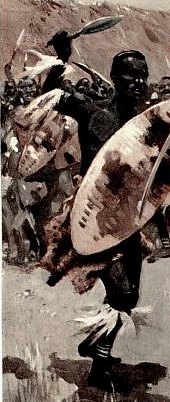|
Lang Hans Van Rensburg
Johannes Jacobus (Lang Hans) Janse van Rensburg (12 August 1779 – July 1836) was a leader of one of the early Voortrekker groups. His entire group of 51 people was massacred by an 'impi is a Zulu word meaning war or combat and by association any body of men gathered for war, for example is a term denoting an army. were formed from regiments () from (large militarised homesteads). In English is often used to refer to a ...' of Manukosi near Inhambane. Only his two children were spared, as a result of an intervention by another Zulu warrior. Included in the party was Nicholaas Balthasar Prinsloo, who was a Slagtersnek rebel, his wife, Petronella Maria Krugel/Kruger and their family.Visagie, Jan C., Voortrekkerstamouers 1835 - 1845. Protea Boekhuis. Pretoria. 2011. Page 406 References 1779 births 1836 deaths Great Trek South African explorers {{SouthAfrica-bio-stub ... [...More Info...] [...Related Items...] OR: [Wikipedia] [Google] [Baidu] |
Great Trek
The Great Trek ( af, Die Groot Trek; nl, De Grote Trek) was a Northward migration of Dutch-speaking settlers who travelled by wagon trains from the Cape Colony into the interior of modern South Africa from 1836 onwards, seeking to live beyond the Cape's British colonial administration. The Great Trek resulted from the culmination of tensions between rural descendants of the Cape's original European settlers, known collectively as ''Boers'', and the British Empire. It was also reflective of an increasingly common trend among individual Boer communities to pursue an isolationist and semi-nomadic lifestyle away from the developing administrative complexities in Cape Town. Boers who took part in the Great Trek identified themselves as ''voortrekkers'', meaning "pioneers", "pathfinders" (literally "fore-trekkers") in Dutch and Afrikaans. The Great Trek led directly to the founding of several autonomous Boer republics, namely the South African Republic (also known simply as the '' ... [...More Info...] [...Related Items...] OR: [Wikipedia] [Google] [Baidu] |
Inhambane
Inhambane, also known as Terra de Boa Gente (''Land of Good People''), is a city located in southern Mozambique, lying on Inhambane Bay, 470 km northeast of Maputo. It is the capital of the Inhambane Province and according to the 2017 census has a population of 79,724, growing from the 1997 census of 54,157. The settlement owes its existence to a deep inlet into which the small Mutamba River flows. Two protective sandy headlands protect the harbor and form a sandbank. The sister town of Maxixe is located across the bay of Inhambane. History Inhambane is one of the oldest settlements on Mozambique's eastern coast. Dhows traded here as early as the 11th century. Muslim and Persian traders were the first outsiders to arrive to the area by sea and traded pearls and ambergris, and they also traded at Chibuene in the south. The area became well known for its local cotton spinning and production by the Tonga tribe. Sometime before the Portuguese reached the area, the Karanga ha ... [...More Info...] [...Related Items...] OR: [Wikipedia] [Google] [Baidu] |
Mozambique
Mozambique (), officially the Republic of Mozambique ( pt, Moçambique or , ; ny, Mozambiki; sw, Msumbiji; ts, Muzambhiki), is a country located in southeastern Africa bordered by the Indian Ocean to the east, Tanzania to the north, Malawi and Zambia to the northwest, Zimbabwe to the west, and Eswatini and South Africa to the southwest. The sovereign state is separated from the Comoros, Mayotte and Madagascar by the Mozambique Channel to the east. The capital and largest city is Maputo. Notably Northern Mozambique lies within the monsoon trade winds of the Indian Ocean and is frequentely affected by disruptive weather. Between the 7th and 11th centuries, a series of Swahili port towns developed on that area, which contributed to the development of a distinct Swahili culture and language. In the late medieval period, these towns were frequented by traders from Somalia, Ethiopia, Egypt, Arabia, Persia, and India. The voyage of Vasco da Gama in 1498 marked the arrival of t ... [...More Info...] [...Related Items...] OR: [Wikipedia] [Google] [Baidu] |
Impi
is a Zulu word meaning war or combat and by association any body of men gathered for war, for example is a term denoting an army. were formed from regiments () from (large militarised homesteads). In English is often used to refer to a regiment, which is called an in or the army. Its beginnings lie far back in historic local warfare customs, when groups of armed men called battled. They were systematised radically by the king Shaka, who was then only the exiled illegitimate son of king Senzangakhona kaJama, but already showing much prowess as a general in the army () of Mthethwa king Dingiswayo in the Ndwandwe–Zulu War of 1817–1819. Genesis of the impi The Zulu impi is popularly identified with the ascent of Shaka, ruler of the relatively small Zulu tribe before its explosion across the landscape of southern Africa, but its earliest shape as an instrument of statecraft lies in the innovations of the Mthethwa chieftain Dingiswayo, according to some historians ( ... [...More Info...] [...Related Items...] OR: [Wikipedia] [Google] [Baidu] |
Soshangane
Soshangana KaZikode (), born Soshangana Nxumalo, was the Founder and the Monarch of the Gaza Empire, which at the height of its power stretched from the Limpopo river in southern Mozambique up to the Zambezi river in the north. Soshangana ruled over the Gaza state from 1825 until his death in 1858. Soshangana was also known by the name of Manukosi. Early life Soshangane was born in ca 1780 in modern-day KwaNongoma, KwaZulu to Zikode kaGasa, a chief of the junior branch () of the Ndwandwe. His younger brother was Mhlabawadabuka. The Gasa occupied the Mkuze region around the eTshaneni mountain (Ghost Mountain) whilst the senior house under Zwide lived in Magudu near the Pongola Valley. Around the same time that the Ndwandwe were growing in military power, Zwide ascended to the Ndwandwe-Nxumalo throne following the death of his father Langa KaXaba. The emergence of northern Nguni kingdoms Three powerful chiefdoms emerged in the series of wars that engulfed the Nguni states. Th ... [...More Info...] [...Related Items...] OR: [Wikipedia] [Google] [Baidu] |
Great Trek Map Full
Great may refer to: Descriptions or measurements * Great, a relative measurement in physical space, see Size * Greatness, being divine, majestic, superior, majestic, or transcendent People * List of people known as "the Great" *Artel Great (born 1981), American actor Other uses * ''Great'' (1975 film), a British animated short about Isambard Kingdom Brunel * ''Great'' (2013 film), a German short film * Great (supermarket), a supermarket in Hong Kong * GReAT, Graph Rewriting and Transformation, a Model Transformation Language * Gang Resistance Education and Training Gang Resistance Education And Training, abbreviated G.R.E.A.T., provides a school-based, police officer instructed program that includes classroom instruction and various learning activities. Their intention is to teach the students to avoid gang ..., or GREAT, a school-based and police officer-instructed program * Global Research and Analysis Team (GReAT), a cybersecurity team at Kaspersky Lab *'' Great!'', a 20 ... [...More Info...] [...Related Items...] OR: [Wikipedia] [Google] [Baidu] |
Voortrekker
The Great Trek ( af, Die Groot Trek; nl, De Grote Trek) was a Northward migration of Dutch-speaking settlers who travelled by wagon trains from the Cape Colony into the interior of modern South Africa from 1836 onwards, seeking to live beyond the Cape's British colonial administration. The Great Trek resulted from the culmination of tensions between rural descendants of the Cape's original European settlers, known collectively as ''Boers'', and the British Empire. It was also reflective of an increasingly common trend among individual Boer communities to pursue an isolationist and semi-nomadic lifestyle away from the developing administrative complexities in Cape Town. Boers who took part in the Great Trek identified themselves as ''voortrekkers'', meaning "pioneers", "pathfinders" (literally "fore-trekkers") in Dutch and Afrikaans. The Great Trek led directly to the founding of several autonomous Boer republics, namely the South African Republic (also known simply as the '' ... [...More Info...] [...Related Items...] OR: [Wikipedia] [Google] [Baidu] |
Slachter's Nek Rebellion
The Slachter's Nek Rebellion was an uprising by Boers in 1815 on the eastern border of the Cape Colony. Background In 1815 a farmer from the eastern border of the Cape Colony, Frederik Bezuidenhout, was summoned to appear before a magistrate's court after repeated allegations of mistreating one of his Khoi labourers. Bezuidenhout resisted arrest and fled to a cave near his home, where he defended himself against the Coloured soldiers sent to capture him. When he refused to surrender, he was shot dead by one of the soldiers. Uprising Hendrik Prinsloo, along with a neighbor Hans Bezuidenhout organised an uprising against the British colonial authority, which was believed, by the Boers (Afrikaner farmers) to be hostile towards themselves and to favour Blacks and Coloureds above the Afrikaner farmers. The Boers also had more than 3,600 cattle stolen and felt the British were not doing enough to protect them from the attacks by the Xhosas. On 18 November a commando of rebels met an ar ... [...More Info...] [...Related Items...] OR: [Wikipedia] [Google] [Baidu] |
1779 Births
Events January–March * January 11 – British troops surrender to the Marathas in Wadgaon, India, and are forced to return all territories acquired since 1773. * January 11 – Ching-Thang Khomba is crowned King of Manipur. * January 22 – American Revolutionary War – Claudius Smith is hanged at Goshen, Orange County, New York for supposed acts of terrorism upon the people of the surrounding communities. * January 29 – After a second petition for partition from its residents, the North Carolina General Assembly abolishes Bute County, North Carolina (established 1764) by dividing it and naming the northern portion Warren County (for Revolutionary War hero Joseph Warren), the southern portion Franklin County (for Benjamin Franklin). The General Assembly also establishes Warrenton (also named for Joseph Warren) to be the seat of Warren County, and Louisburg (named for Louis XVI of France) to be the seat of Franklin County. * February ... [...More Info...] [...Related Items...] OR: [Wikipedia] [Google] [Baidu] |
1836 Deaths
Events January–March * January 1 – Queen Maria II of Portugal marries Ferdinand II of Portugal, Prince Ferdinand Augustus Francis Anthony of Saxe-Coburg-Gotha. * January 5 – Davy Crockett arrives in Texas. * January 12 ** , with Charles Darwin on board, reaches Sydney. ** Will County, Illinois, is formed. * February 8 – London and Greenwich Railway opens its first section, the first railway in London, England. * February 16 – A fire at the Lahaman Theatre in Saint Petersburg kills 126 people."Fires, Great", in ''The Insurance Cyclopeadia: Being an Historical Treasury of Events and Circumstances Connected with the Origin and Progress of Insurance'', Cornelius Walford, ed. (C. and E. Layton, 1876) p76 * February 23 – Texas Revolution: The Battle of the Alamo begins, with an American settler army surrounded by the Mexican Army, under Antonio López de Santa Anna, Santa Anna. * February 25 – Samuel Colt receives a United States patent for the Colt Firearms, Colt ... [...More Info...] [...Related Items...] OR: [Wikipedia] [Google] [Baidu] |






.jpg)